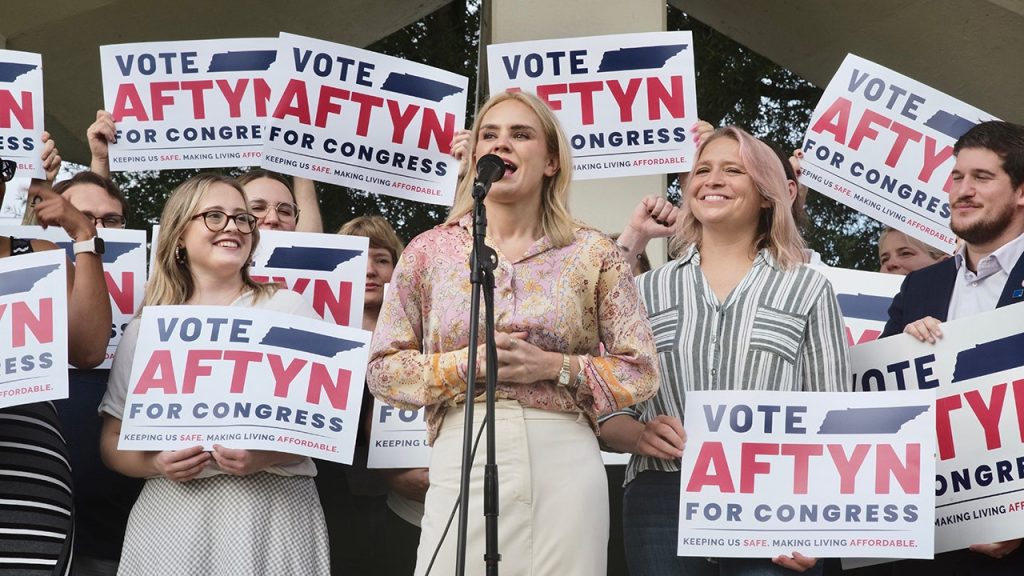Listen to the article
Democrat’s Congressional Campaign Clashes with Voting Record on Tax Cuts and Budget Issues
A Tennessee Democratic state representative running for Congress has come under scrutiny as her campaign messaging appears to contradict her legislative voting record on tax relief measures for state residents and businesses.
State Rep. Aftyn Behn, representing Tennessee’s 51st District, is campaigning to fill the vacancy left by outgoing Republican Congressman Mark Green in the state’s 7th Congressional District. While her campaign portrays her as a champion for working-class Americans, her opponents point to several votes against tax relief measures during her time in the state legislature.
Last year, Behn voted against a bill that the Tennessee General Assembly Fiscal Review Committee estimated would have provided approximately $1.5 billion in tax refunds for small business owners throughout the state. The same legislation would have reduced the yearly tax burden for Tennessee business owners by about $400 million.
Behn has also been vocal in her opposition to the extension of former President Donald Trump’s 2017 tax cuts, referring to Republicans’ H.R. 1 as the “Big Beautiful Bill” and characterizing it as “a giveaway to the wealthy.” However, according to estimates from the Tax Foundation, if these tax cuts had expired, residents in Tennessee’s 7th Congressional District would have faced a tax increase of approximately $3,717 per taxpayer.
“To win, Democrats need to focus on what really matters: making life more affordable for working people,” Behn stated after the bill’s passage. “Washington Republicans did the opposite by passing this #BigBullsh–Bill. Gutting healthcare and giving handouts to billionaires.”
Even the New York Times has acknowledged that independent analyses of Trump’s 2017 tax cuts “have consistently found that a large majority of Americans would owe less because of the law.”
Earlier this year, Behn also voted against Tennessee’s 2025-2026 fiscal year budget that would have increased the state’s rainy day fund, which provides financial stability during periods of low revenue. That same budget included community funding for essential services like volunteer fire departments, emergency medical services, senior centers, teacher bonuses, and school security measures.
During her legislative tenure, Behn has advocated for repealing Tennessee’s grocery tax, arguing it would benefit hard-working Tennesseans year-round. Republican opponents counter that her proposed alternative would create a business enterprise tax that would raise taxes on small businesses by approximately $800 million.
“Aftyn Behn’s policies would skyrocket the cost of living even more for hardworking Tennesseans,” claimed her Republican opponent, Trump-backed Matt Van Epps. “Aftyn has repeatedly voted against tax cuts and proposed new taxes, taking more money from your pocket. I’ll always fight to lower taxes and bring down costs so that working families can get ahead.”
Local media reports have drawn comparisons between Behn and progressive politicians like New York City mayor-elect Zohran Mamdani and Congresswoman Alexandria Ocasio-Cortez. The Dickson County Democratic Party has even described Behn as “our very own AOC of TN.”
In a CNN appearance discussing the comparison to Mamdani, Behn stated, “His message is one of helping working families across New York, my message is one of helping working families across Tennessee. We need to go back to pocketbook issues, especially in states like Tennessee where people are living unaffordable lives and suffering as a result of Republican policies.”
The race for Tennessee’s 7th Congressional District represents a significant test case for Democratic messaging on economic issues in a traditionally Republican-leaning district. Whether Behn’s campaign rhetoric can overcome criticism of her voting record will be determined when voters head to the polls.
Fact Checker
Verify the accuracy of this article using The Disinformation Commission analysis and real-time sources.




8 Comments
This is an intriguing case study in political messaging and voter expectations. Candidates should be judged on their full body of work, not just their election-year promises.
Tax policy is a complex issue, and reasonable people can disagree. But voters will want to see if this candidate’s actions match their rhetoric once in office. Campaign promises are easy, governing is harder.
Exactly. It’s critical to look at a candidate’s full record, not just their campaign messaging. Actions speak louder than words when it comes to serving the working class.
This is an interesting case study in the tensions between campaign rhetoric and legislative voting records. Voters will want to scrutinize the candidate’s full record to see if their actions match their promises.
Absolutely, transparency and accountability are so important when it comes to elected officials. I’ll be curious to see how this candidate addresses the discrepancy between their campaign messaging and voting history.
This highlights the need for nuance and context when evaluating a candidate’s positions. While the voting record raises questions, the candidate may have valid reasons or a more complex stance. Voters should look for substance, not just slogans.
It’s concerning to see a candidate take positions that appear to contradict their past votes. Voters deserve leaders who will consistently fight for the working class, not just during election season.
I agree. It’s important for voters to look beyond the campaign spin and understand a candidate’s full record. Consistency and authenticity should be key considerations.